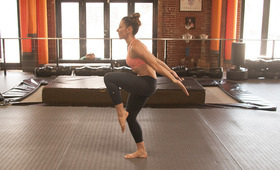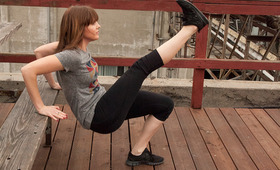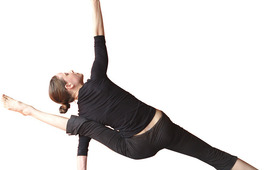Body By Kit: Are You Addicted To Exercise?
Published Jan 22, 2012


"Are You Addicted To Exercise?" by Kit Rich
Want to lose weight? Work out! Want to feel better? Work out! Want to have more energy? Work out! Want to be happier? Work out! Annoyed at me? Work out! Kidding.
Exercise is often promoted as a cure-all to end all things unwanted and, for the most part, this is true. A simple walk for even 30 minutes a day has been proven to release endorphins, reduce weight gain and hypertension, as well as helping to reverse other signs of disease and aging.
But you can have too much of a good thing. At that point—when fitness enthusiast turns obsessive and exercise is no longer for just your health—the obsession for perfection (whether perfect abs or that faster mile) can potentially harm your body and cripple other aspects of your life.
I used to be a fitness enthusiast turned obsessive. I exercised for hours a day and became anxious if I missed one workout. I had a persistent knee injury that I ignored, and my joints hurt all the time. I limited my calorie intake so drastically that my body was not able to support the amount of physical stress I was putting on it. I also had no love life because my routine didn’t allow for spontaneity and indulgence. Even though I looked incredibly fit and thin, I became even more obsessed with fixing even the slightest “flaw.” But no matter how fit I was, it was never enough—I was always depressed and lonely.
It wasn’t until I became a trainer that I witnessed these same traits in clients and was able to see this obsession from an outsider’s point of view. I saw beautiful women abuse themselves for reasons that were not based on any reality other than their warped perception of themselves. Although it is a fine line from enthusiast to obsessive, an obsessive exerciser is easier to spot when you understand the difference between the two and the motivation behind the obsession.
Both fitness enthusiasts and obsessive exercisers love to work out. They are people who train regularly, possibly every day for extended periods of time. They find balance in their lives because they give themselves the time to work out, and they are always striving to better themselves. They love the “high” they feel after exercising, and crave it in the same way that coffee addicts yearn for their morning cup of joe. Both tend to be fit and healthy looking, and in fact, they may even be admired by their peers for their physique, dedication and will power.
But enthusiast becomes obsessive when the love for working out becomes an absolute “do or die” need to exercise; even if it means ignoring work duties, family obligations and injury warning signs. Obsessive exercisers (also known as anorexic athletica or obligatory exerciser) put exercise above everything. They plan their entire day around it, and if they don’t work out, they feel a sense of guilt and anxiety. They watch every calorie consumed and barely ever indulge.
The motivation behind all of this tends to be a lack of self-esteem, possible depression, and the need for control. Tailoring your life around a rigorous fitness regime provides a level of empowerment and endorphin release that maybe other aspects of your life don’t provide.
Emotionally, this can take a toll because obsessive exercisers may avoid social situations so they won't disrupt their workout routine and may end up isolating themselves from their peers and loved ones. Physically, this obsession can lead to over-training, which can cause injury and exhaustion. An obsessive exerciser may ignore signs of fatigue, tension or soreness, and decide to power through yet another workout. Too much exercise can alter hormone balance and cause lasting physical harm. It can also lead to premature osteoporosis and adrenal exhaustion.
Through a lot of self examination and body awareness, I eventually found the balance and happiness that working out and fitness truly provides, and if you follow these tips, you will hopefully find the same.
Physical signs that you might be an obsessive exerciser:
-Body fatigue
-Joint pain
-Sudden lack of motivation or physical inability to finish your exercise routine
-Change or decrease in appetite
If you are an obsessive exerciser, or you know someone who might be, please follow these tips to help scale you back to balance!
5 Ways to Overcome Exercise Addiction:
1. Recognize it for what it is
First step is recognition with no judgement attached. The truth is, there are worse things to be addicted to. But now that you know this might be a problem, it is time to own up to it and learn to find joy in other avenues of your life.
2. Rest
Fact is, your body needs rest. Take a few days off or even a week. Rest allows your body to rebuild and repair itself and it actually will thank you for the rest by making your body feel more rejuvenated. If you do workout consecutively back to back, try not to do the same type of work out twice in a row.
3. Seek Help
If you’re noticing that resting has become difficult and that you are having problems being positive, seek professional help. There might be something deeper going on in your life that you’re not addressing. Sometimes, simply talking to a friend you know and trust helps too. Either way, it’s time to be honest about yourself and the motivations behind your obsession.
4. Body Awareness
I can’t stress enough how important it is to listen to your body. Every person is different and its needs are different. What works for one person doesn’t work for another. If your body is giving you all the physical signs that it is in pain and needs time to recover, please listen to it.
5. Engage in exercise that involves groups of people
Since most obsessives tend to work out by themselves, a great change would be to find a group of like-minded individuals to work out with. Try a fitness class or a bicycling group. This way it becomes more about socializing and less about the addiction.

Kit Rich is Los Angeles-based fitness trainer with endless exercise and nutritional know-how. Hollywood's hottest stars are addicted to Kit's unique, multi-disciplined approach that combines cardio, yoga, Pilates, and weight training. Kit's clients are immediately taken by her funny and honest approach to health and fitness. She treats her clients as she treats herself, "with a hard challenge, sensibility, sensitively, and a good laugh." Follow Kit on Twitter @kitrichfitness
You Might Also Like
-

outFit with Kit
New workout to shape your core: SHIFT
- 1794
-

outFit with Kit
The Perfect Workout Playlist in 6 Steps
- 751
-

outFit with Kit
Body By Kit: High Butt, Happy Life
- 792
-

outFit with Kit
Park Bench Workout Routine
- 2548
-

outFit with Kit
8 Breakup Survival Tips
- 939
-

outFit with Kit
outFit With Kit: Sitting Fit
- 403
-

outFit with Kit
Why I Don’t Believe In New Year’s Resolutions
- 152
-

outFit with Kit
Yoga and Meditation for Anxiety
- 1014





 Kit Rich is Los Angeles-based fitness trainer with endless exercise and nutritional know-how. Hollywood's hottest stars are addicted to Kit's unique, multi-disciplined approach that combines cardio, yoga, Pilates, and weight training. Kit's clients are immediately taken by her funny and honest approach to health and fitness. She treats her clients as she treats herself, "with a hard challenge, sensibility, sensitively, and a good laugh." Follow Kit on Twitter @kitrichfitness
Kit Rich is Los Angeles-based fitness trainer with endless exercise and nutritional know-how. Hollywood's hottest stars are addicted to Kit's unique, multi-disciplined approach that combines cardio, yoga, Pilates, and weight training. Kit's clients are immediately taken by her funny and honest approach to health and fitness. She treats her clients as she treats herself, "with a hard challenge, sensibility, sensitively, and a good laugh." Follow Kit on Twitter @kitrichfitness








